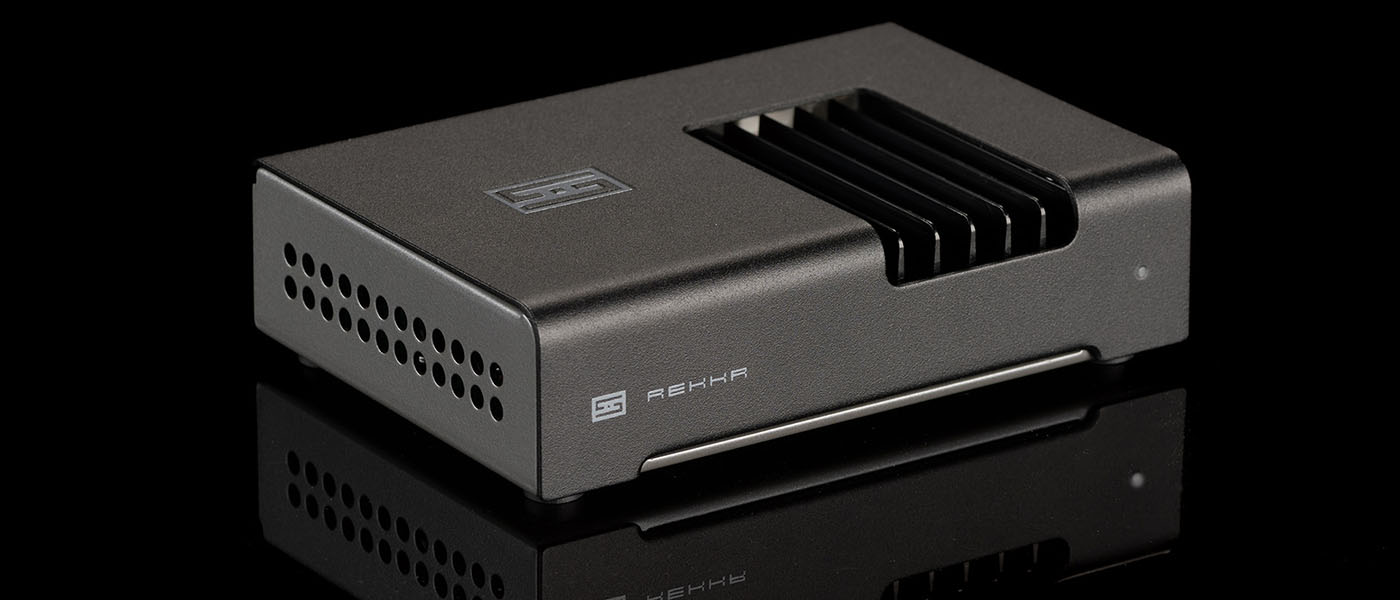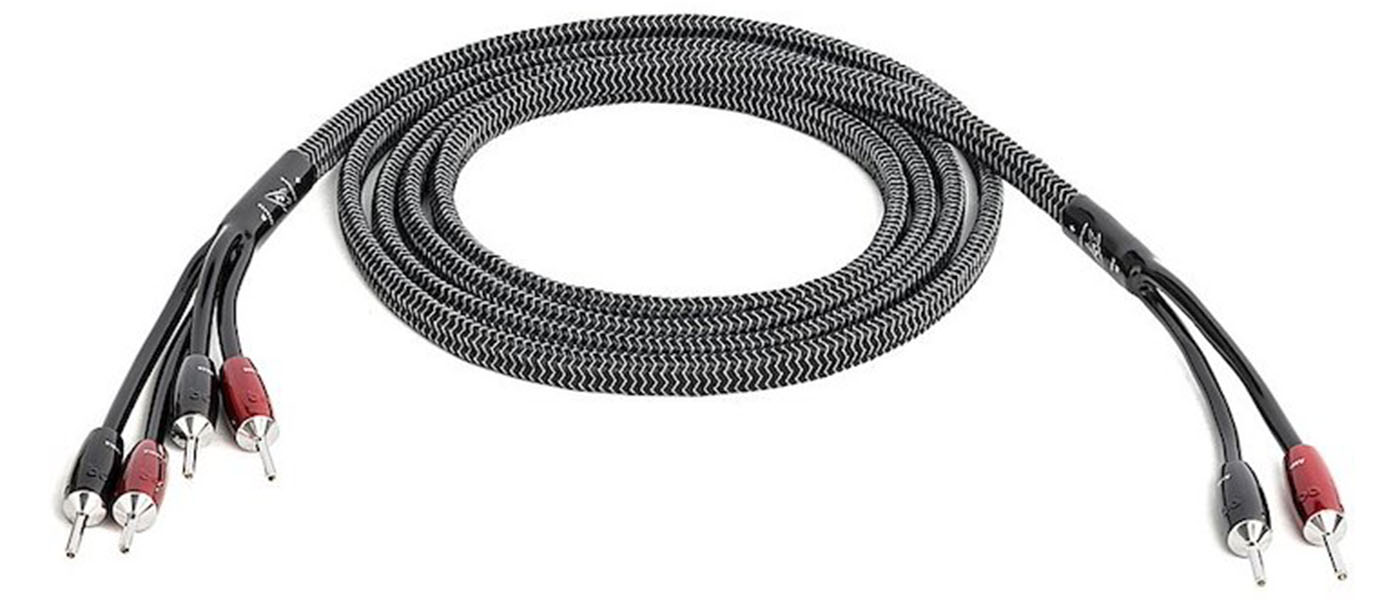AudioQuest, unlike many high-end speaker cable manufacturers, opts for solid-copper conductors rather than the more common multi-strand. The Rocket 44 model under review is the 10-foot, silver banana plug version. So, how does it sound…
The AudioQuest Rocket 44 speaker cables distinguish themselves from other available cables on the market with their high-quality, solid-core construction, their warranty, and their ability to provide bass detail like nothing else. Some might be inclined to dismiss the AudioQuest Rocket 44 loudspeaker cables as “just another over-priced pair of speaker wires.” This might be a mistake. Some other speaker wires may have a brighter sound in the treble, but regardless of the wire gauge, I’ve not found another speaker wire that provides equivalent bass quality, quantity, and clarity.
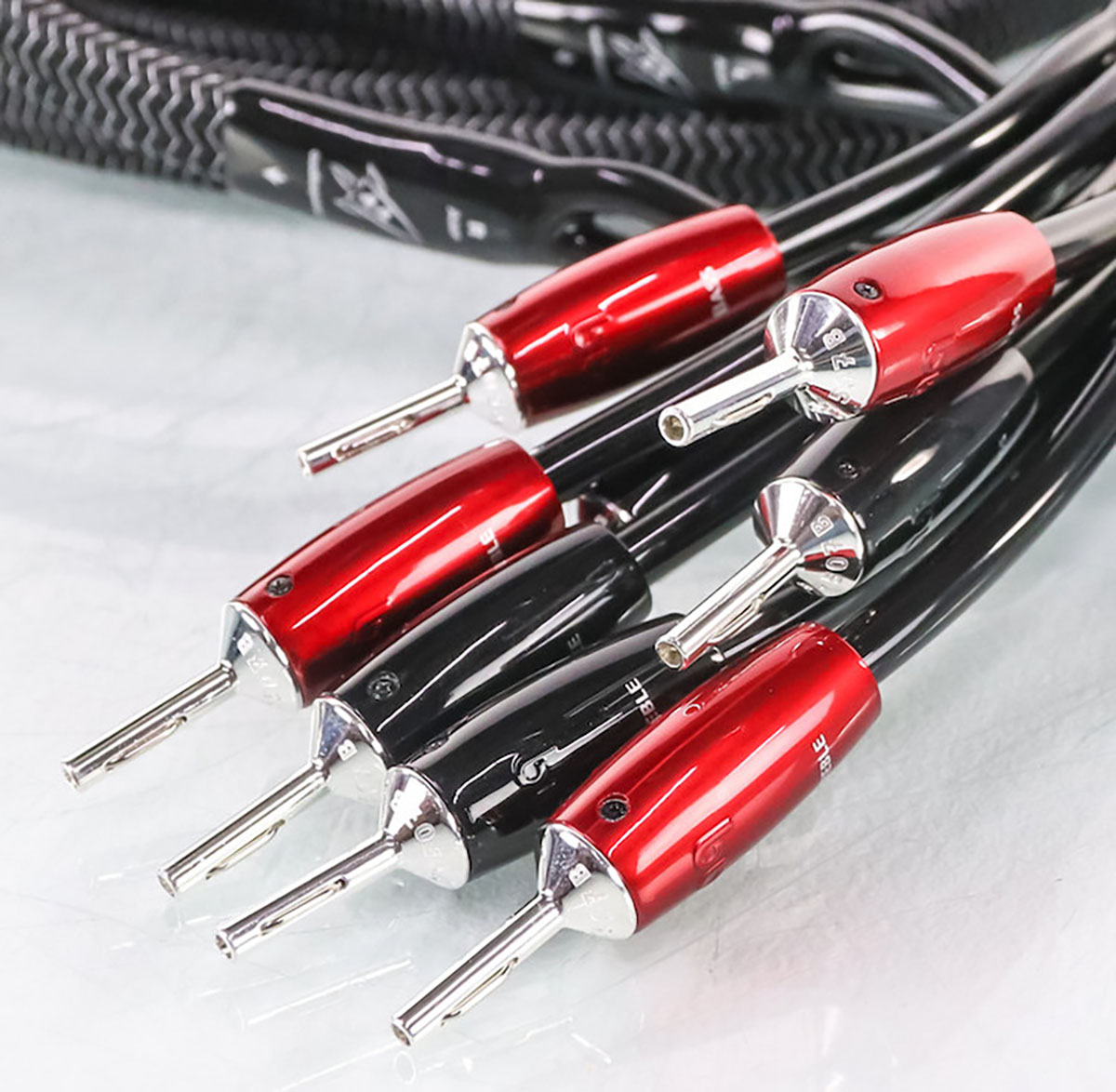
AudioQuest Rocket 44 Speaker Cables Highlights
- Nice banana plugs with spring-loaded blades.
- No locking mechanisms.
- Solid copper core construction.
- Attractive cloth sleeve.
- Directional markings on wires.
- Flexible despite their solid-core construction.
The AudioQuest group has a strong market presence with a variety of speaker wire lines including the Rocket series that these Rocket 44 speaker models belong to. AudioQuest products are widely available at Best Buy, on Amazon, and at a plethora of online retailers. The Rocket 44 speaker cables certainly should not be hard to locate. I’ve had the privilege of reviewing a wide variety of AudioQuest products and have yet to run into one that I didn’t respect. Not each and every one of the AudioQuest products has been the very best match for my particular audio system, but every one I’ve encountered has been well made, had a good warranty, and (more often than not) improved the sound of my system.
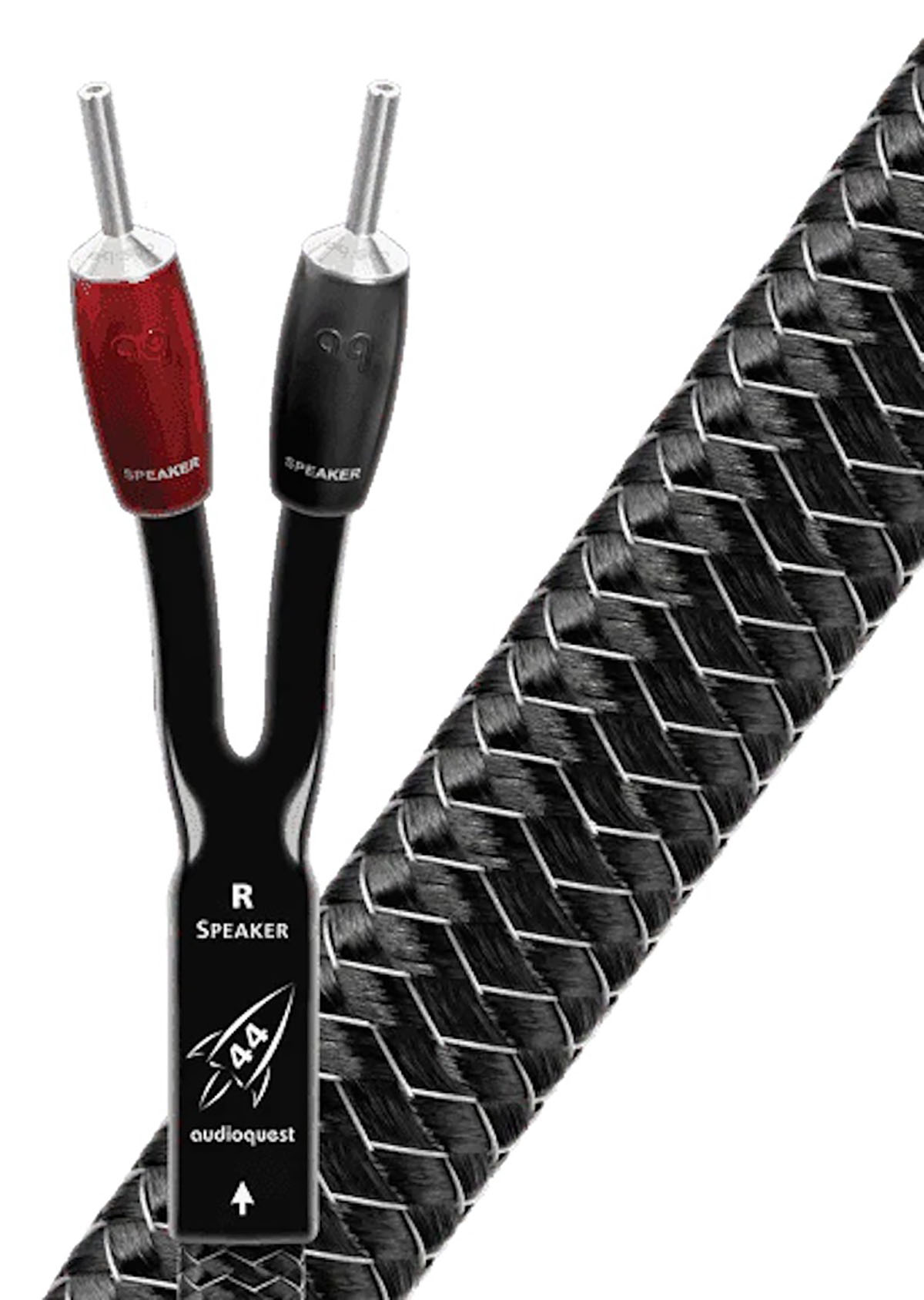
There is a world of dueling theories about what makes a good speaker cable. Some companies claim that high frequencies only travel along the surface of a wire (and although this is unquestionably true in the radio-frequency range, its application to audio frequencies is in dispute). Some companies claim that multiple conductors are necessary (the finer, the better). Other companies insist that those conductors must be individually insulated and electrically joined only at both ends – this is called “Litz wire.” Yet other companies (and AudioQuest falls in this group, at least with their Rocket series wires) claim that a single, solid conductor is more phase-coherent than using multiple conductors.
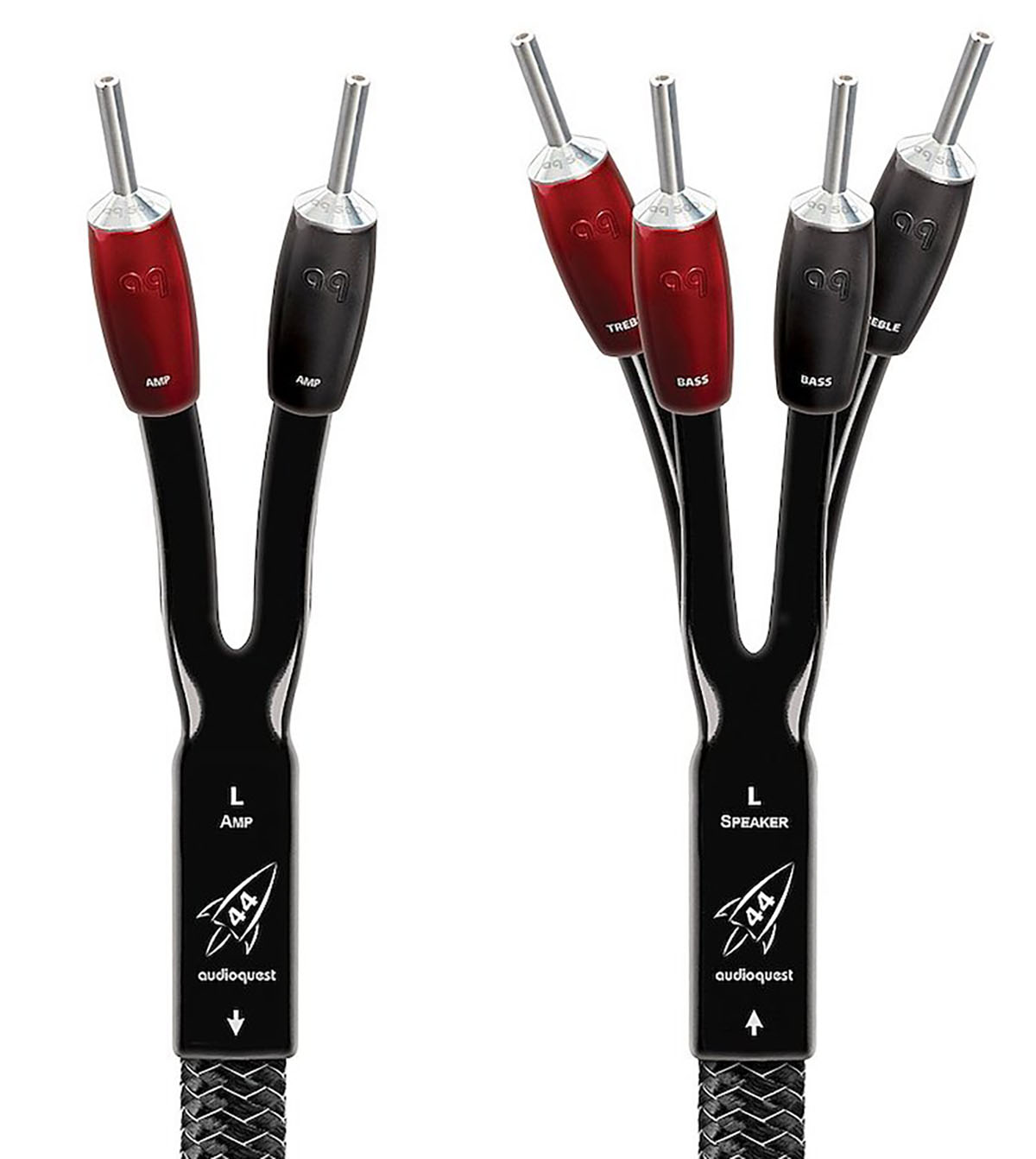
Mr. Bill Low, the founder, and CEO of AudioQuest, contends that the four most important principles in cable design are:
ZERO-Tech (No Characteristic Impedance) – This applies Ultra-Linear Noise-Dissipation across the widest range of frequencies possible. It also enables uncompressed transient current transfer for AC power and loudspeaker/power amplifier applications.
RF/ND-Tech (Patented Radio Frequency / Ground Noise-Dissipation) – This minimizes circuit misbehavior by canceling induced RF noise.
DBS (Dielectric-Bias System) – This has evolved to include RF-Noise Traps that further reduce dielectric distortion and induced noise.
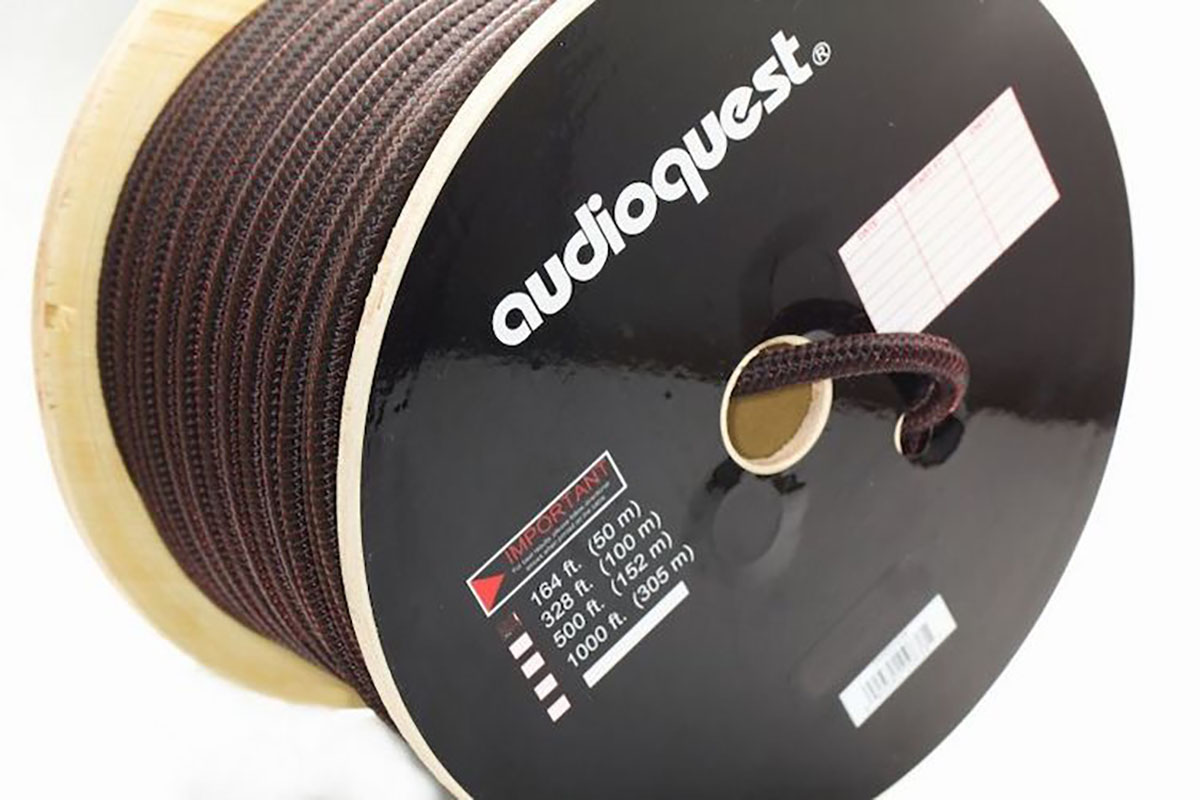
The AudioQuest Rocket 44 speaker cable specifically features:
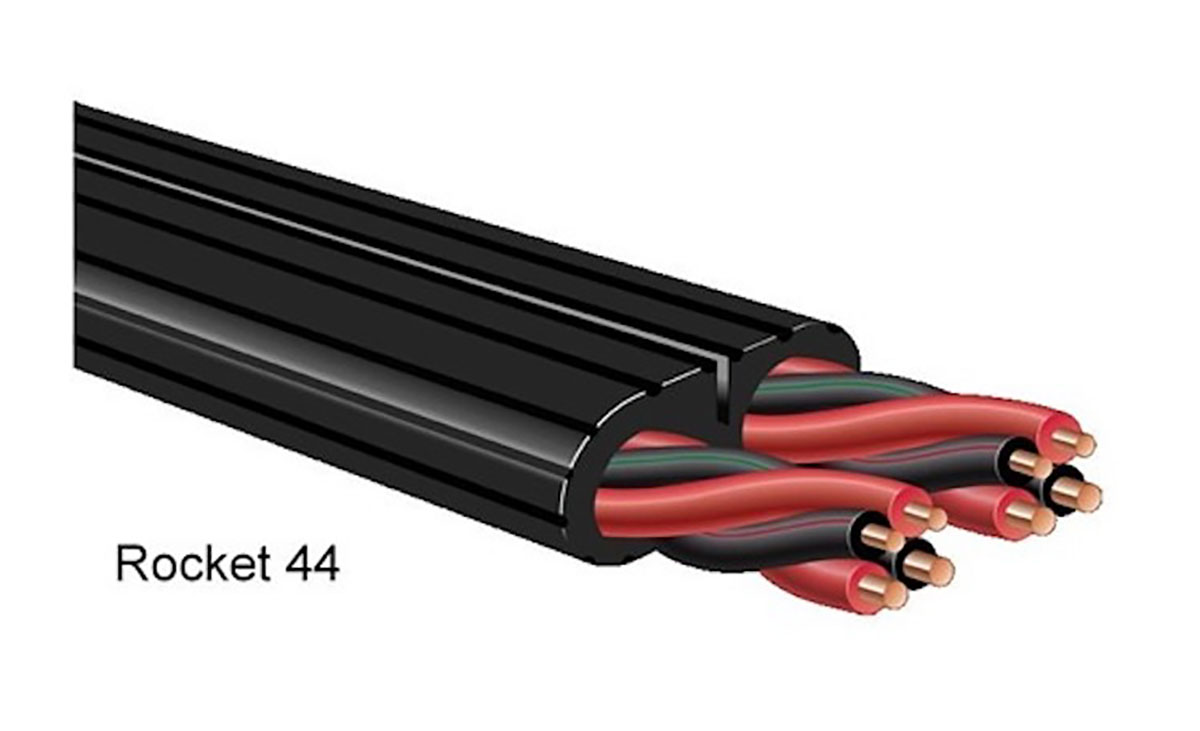
AudioQuest recommends cable risers for their speaker cables. When I asked why, they replied “Cable risers reduce the amount of RF noise that capacitively couples into the speaker cables through all solid flooring materials. Successfully designed and properly used, cable risers will preserve valuable low-level detail for more natural, dynamic, involving performance.”
Secrets Sponsor
As I interpret this, your speaker cables are always, at least to some extent, radio antennas. As with old rabbit-ear antennas, you could improve the reception by touching the antenna. Having your speaker -cables on the floor is essentially the same as touching the antenna. AudioQuest contends that contact with the floor increases the RF reception in the speaker wires. Therefore, preventing the speaker cables from touching the floor (using non-conductive risers) should, at least theoretically, drop the RF reception levels dramatically.
You don’t have to buy boutique risers to accomplish this, either. I went to Lowes and bought 20 black plastic rebar chairs for 68 cents each. The propylene risers are stable, have clips on top to secure the speaker wires, and (most importantly) are non-conductive.
How did cable risers sound? My room has hard floors – I heard no difference between the speaker wires on the floor and up on risers. But my audio amigo has a thickly carpeted room with a thick carpet pad below the carpet. This would theoretically act as a huge capacitor. He reports that cable risers made an audible improvement for his system. Depending on your speaker wires’ susceptibility to RF and the insulating effects of your carpet and pad, you may find cable risers worth investigating.
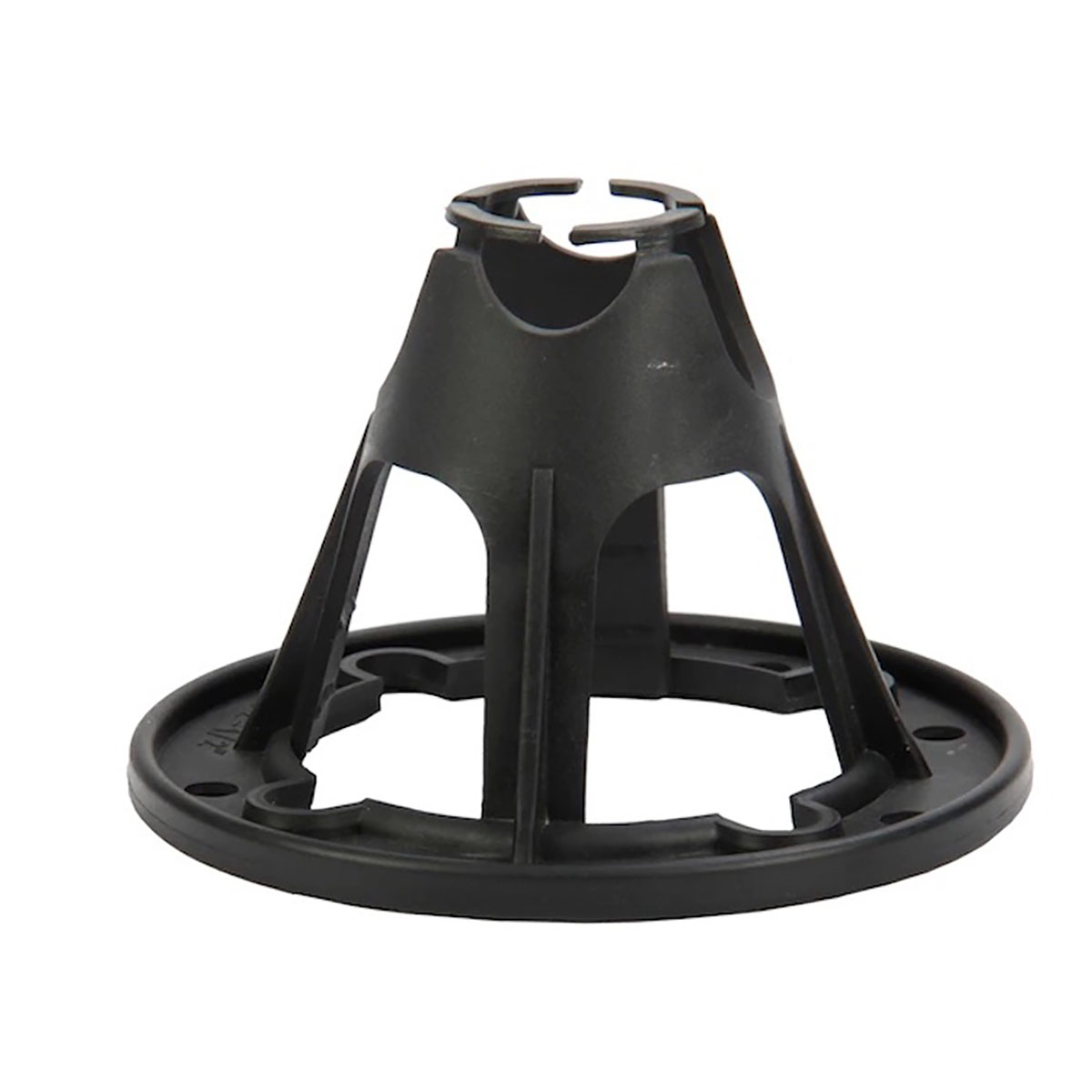
Conductors:
Solid Perfect-Surface Copper (PSC) + and PSC
Gauge:
13 AWG
Geometry:
Double Star Quad
Dielectric:
Foamed Polyethylene (for positive conductors)
Noise-Dissipation:
Carbon-based
Jacket:
Silver / Black braid or PVC
Terminations:
AudioQuest 500 Series Multi-Spades or Bananas
MRSP:
8’ – $879.95, 10’ – $999.95, 12’ – $1,119.95, 15’ – $1,299.95, custom lengths on request, 164’ bulk spools available
Warranty:
Limited Lifetime to the original purchaser
Website:
Company:
SECRETS Tags:
audioquest, rocket44, cables, interconnects, speakers, speaker cables review, speaker cables review 2023
- Marc Audio interconnects and speaker cables
- Wireworld Eclipse 7 speaker cables
- Legenburg Zeus interconnects and speaker cables
- Argentum Aureus speaker cables and interconnects
But pretty is as pretty sounds…
The AudioQuest Rocket 44 speaker cables are part of a large family of AudioQuest wiring products. As with all Audioquest products, the Rocket 44 speaker cables are high quality, consistently produced, and come with a reassuring warranty. As mentioned in the introduction section of this review, AudioQuest maintains a slightly unusual design philosophy. Rather than using a multi-stranded connector, the Rocket 44s use solid-core wire. Does this work? I’d have to say that, at least with some speakers, it does.
Upstream Equipment Used for this Review:
At various times:
Secrets Sponsor
I used the AudioQuest Rocket 44 speaker cables with two pairs of speakers that I had in-house:
I compared the AudioQuest Rocket 44 speaker cables with other speaker wire sets on hand:
All wire sets (including the AudioQuest Rocket 44) were 10 feet in length 1 foot. All sets were terminated with banana plugs.
Music used in listening tests included:

Parov Stelar live at Sieget – Downloaded from YouTube – converted via dBPoweramp to wav format – Separated by Wave Pad Audio Editor into multiple files.
This is a dynamic performance with thunderous bass in certain segments. The AudioQuest Rocket 44 speaker cables seemed to enhance this. With these wires in my system, the music was tonally balanced and exceptionally dynamic – but what set the AudioQuest Rocket 44 wires apart from my normal wiring was the depth and tightness of the bass.
I’m aware that many of my audio amigos disdain the idea that speaker wires can affect the music at all. And I will agree that differences can be subtle on some systems and even inaudible on others. However, if you have a high-resolution system (I do) and are attuned to its sound (I am), then EVERYTHING makes a difference (including speaker wires).
I’ve been a skeptic of “wires make a difference” most of my audio career but have had several experiences that have changed my mind. Back in the day, I heard differences at a local audio store between Monster Cable and Kimber Kable; the Kimber was less harsh in the high frequencies. Later, I bought a pair of Nordost Flatline cables and found that they sounded different from my Kimbers; the Nordost had more extended highs. Now, I’m hearing differences between the AudioQuest Rocket 44 and the other cables in my spare drawer; the Rockets are tighter and stronger in the bass.
Now am I saying that you should go out and get some expensive cables with the expectation that those speaker wires will transform your inexpensive components into state-of-the-art performers? No. That is unrealistic. But what I am saying is that if you already have a high-resolution system in a properly acoustically treated listening space, it is possible to fine-tune it with digital cables, analog interconnects, and speaker wires. Don’t expect miraculous differences and remember that the performance-to-price ratio increases exponentially once you’re above a certain level. In other words, small increases in performance often come at exponential increases in price. Many aren’t able or willing to explore the rarified air of high-end cables, and that’s fine. The best value cables are available for reasonable prices, and those value cables offer 80 to 90 percent of the performance of the AudioQuest Rocket 44 cables. But there IS a difference. Is that small improvement worth the difference in price? Only you can make that decision.

Mr. Jaco Pastorius is considered one of the best electric bass players. His bass solos are enhanced by the AudioQuest Rocket 44 speaker wires and sound as tight and vibrant as I’ve ever heard them sound on my system. Some would argue (and rightly so) that there is more variation and nuance in acoustic bass instruments including the cello and acoustic bass than with electric bass instruments, but a good player, such as Mr. Pastorius pushes the limits of his instrument and the Rocket 44 wires let you hear the artistry clearly.
For some reason, I was ignorant of Mr. Pastorius until recently, but having encountered his playing, I’ve gone out of my way to hear his recordings and remain as impressed as when I initially heard his work.
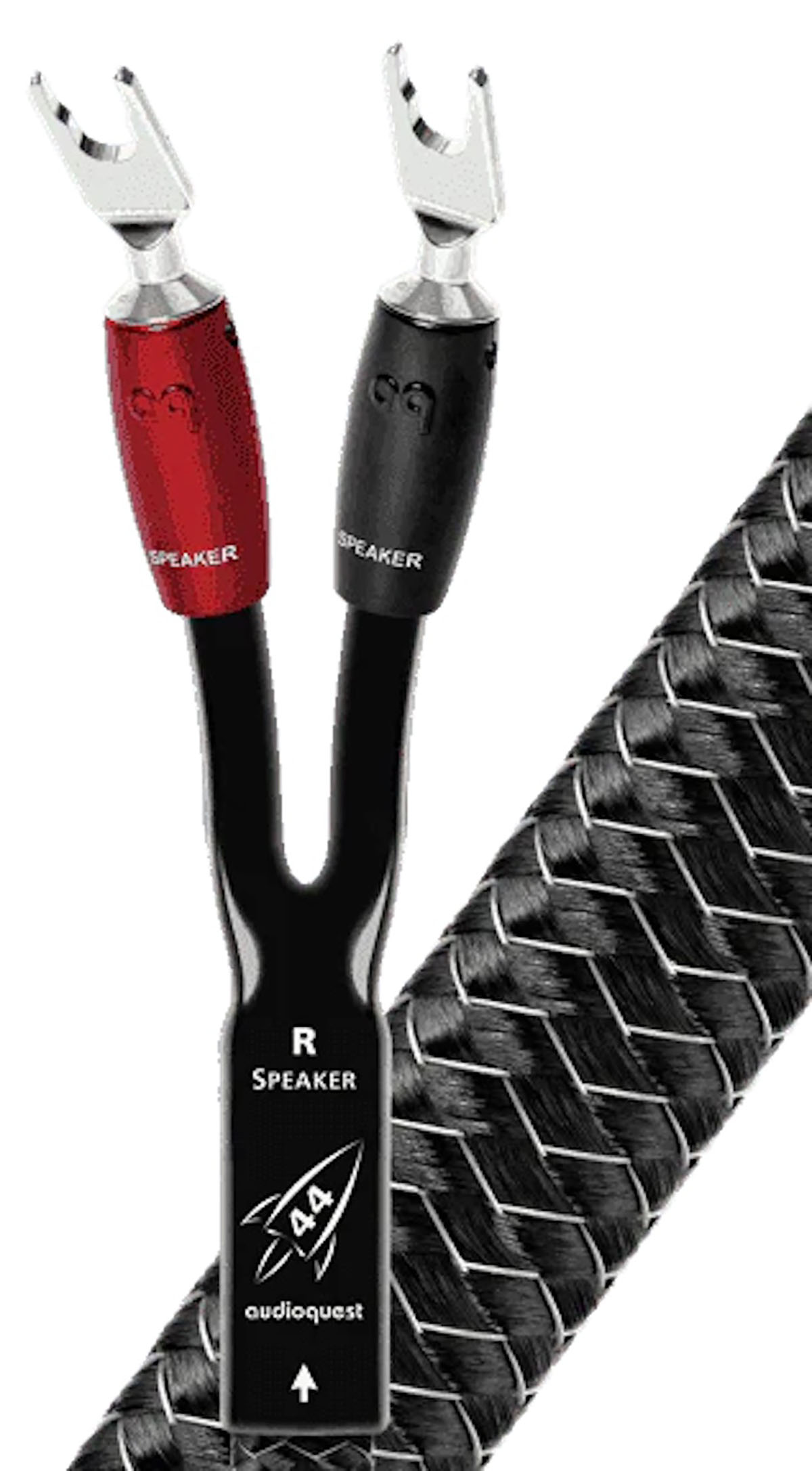
The AudioQuest Rocket 44 speaker cables are the clearest I’ve heard in the bass, and equivalent to all others in the midrange and treble.
- High-quality construction.
- Banana plugs generally stay put with their friction spring blades.
- Lifetime warranty included.
- Attractive fabric wire cover.
- Alternate colors for the wire sleeves.
- Trade-in / Trade-up program (some dealers do offer this).
- Locking banana plug option.
Given that set of attributes, are the AudioQuest Rocket 44 speaker cables worth their asking price of $999.95 per pair? That is a question that I cannot answer for you. IF your system is already performing at its best in an optimized room; IF that sum of money wouldn’t be better spent improving another part of your system; IF you can afford a premium product like the Rocket 44s, then maybe. The AudioQuest Rocket 44 speaker wires are some of the best speaker wires I’ve heard (with my speakers, in my room, and to my ears). Will they work their same magic in your system? You’ll have to try them and decide for yourself.


